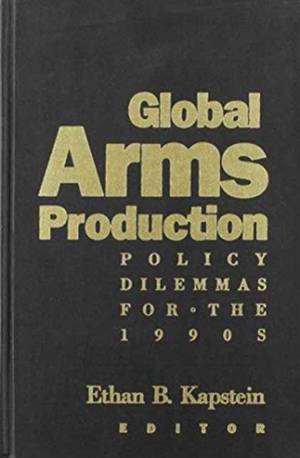
Door een staking bij bpost kan je online bestelling op dit moment iets langer onderweg zijn dan voorzien. Dringend iets nodig? Onze winkels ontvangen jou met open armen!
- Afhalen na 1 uur in een winkel met voorraad
- Gratis thuislevering in België vanaf € 30
- Ruim aanbod met 7 miljoen producten
Door een staking bij bpost kan je online bestelling op dit moment iets langer onderweg zijn dan voorzien. Dringend iets nodig? Onze winkels ontvangen jou met open armen!
- Afhalen na 1 uur in een winkel met voorraad
- Gratis thuislevering in België vanaf € 30
- Ruim aanbod met 7 miljoen producten
Zoeken
€ 113,45
+ 226 punten
Omschrijving
Why do states collaborate in the production of advanced weaponry? Under what conditions do such collaborative arrangements succeed? What are the implications of armaments collaboration for the international economic and security environments?
Arms collaboration is not a new phenomenon, but there is increasing debateóboth in the United States and abroadóover the associated costs and benefits. Critics charge that collaborative projects result in technology give-aways, the creation of defense-industrial competitors, and the loss of domestic jobs. Supporters argue that the very same projects strengthen alliance relations, provide access to new technology, and result in arms sales which might otherwise have been lost to foreign competitors.
In Global Arms Production these issues are addressed by distinguished contributors such as Ethan B. Kapstein, Jacques S. Gansler, William Keller, Joel L. Johnson, Jack Nun, Robert H. Trice, C. Michael Farr, Grant T. Hammond and Stanley Sienkiewicz. Co-published with the Center for International Affairs of Harvard University.
Arms collaboration is not a new phenomenon, but there is increasing debateóboth in the United States and abroadóover the associated costs and benefits. Critics charge that collaborative projects result in technology give-aways, the creation of defense-industrial competitors, and the loss of domestic jobs. Supporters argue that the very same projects strengthen alliance relations, provide access to new technology, and result in arms sales which might otherwise have been lost to foreign competitors.
In Global Arms Production these issues are addressed by distinguished contributors such as Ethan B. Kapstein, Jacques S. Gansler, William Keller, Joel L. Johnson, Jack Nun, Robert H. Trice, C. Michael Farr, Grant T. Hammond and Stanley Sienkiewicz. Co-published with the Center for International Affairs of Harvard University.
Specificaties
Betrokkenen
- Auteur(s):
- Uitgeverij:
Inhoud
- Aantal bladzijden:
- 260
- Taal:
- Engels
Eigenschappen
- Productcode (EAN):
- 9780819185273
- Verschijningsdatum:
- 30/06/1992
- Uitvoering:
- Hardcover
- Formaat:
- Genaaid
- Afmetingen:
- 152 mm x 229 mm
- Gewicht:
- 453 g

Alleen bij Standaard Boekhandel
+ 226 punten op je klantenkaart van Standaard Boekhandel
Beoordelingen
We publiceren alleen reviews die voldoen aan de voorwaarden voor reviews. Bekijk onze voorwaarden voor reviews.











